
Free at Noon | photo by Megan Kelly for WXPN
Interludes: A true story of grief and love at Free at Noon
Catherine Ricketts was on XPN’s staff in 2013-2015. In this essay, she recalls how her weekly encounters with music during the Free at Noon concert series helped to harmonize conflicting emotions of love and grief during her time at the station.
It was noon, but it felt like twilight in the dim and windowless club. It was noon, so I was taking lunch, and on Fridays, that meant music. The crowd was sipping beers in the near-dark, waiting for the show to start.
Each week, the station hosted a live broadcast that was free to the public. Our studio shared a building with a mid-sized concert venue, and a perk of working here was slipping into these shows for a few minutes at the end of the week, escaping the spreadsheets that make up so much of the work even in a hip field like the music industry.
I found it disorienting to leave the sunlit office and descend to the basement, where the band was sound checking drum beats and half-songs under bright lights while I stood, shadowed, by the bar. Though it was the most public thing I did all week — 600 strangers streamed in when the doors opened — the untimely darkness was pleasingly private. While the band played, I could barely be seen. As the speakers pealed, no one could hear me rustle, or breathe, or weep.

December 6 and I’m ebullient. Lucius is on stage, the singers’ hair cropped in twin blonde bobs, their collared dresses and knee socks contiguous with the sixties-inspired pop they play. Sure, my dad is sick. A tumor is slowly swelling in his brain, crippling his gait and confusing his speech. But three weeks ago I landed this job, and after work I’m going to play my own songs at a house show in South Philly, so today I’m optimistic about the shape my life is taking.
I dance a little and notice that the gestures of the frontwomen are perfectly in sync: the sway of their shoulders, the pop of their knees. Jess Wolfe and Holly Laessig sing nearly every note together, locking eyes. Theirs is the kind of vocal blend that can only be forged in intimacy and discipline, the kind that makes you long to be tuned and fused to another person.
At dusk I sling a guitar over my shoulder and walk to Christian Street. The glass on the front door is fogged. The house is so packed I can’t push further than the vestibule. And there he is, right in the doorway. Everyone else is hushed and fixed on a folk singer in the living room, so he and I lock eyes and smile silently and I settle beside him until the set’s over. Then he turns to me. “Catherine, right?” He remembers me from brief meetings through friends years back. I’ve forgotten his name. “Austin,” he reminds me. Tonight is the beginning of our own attunement.
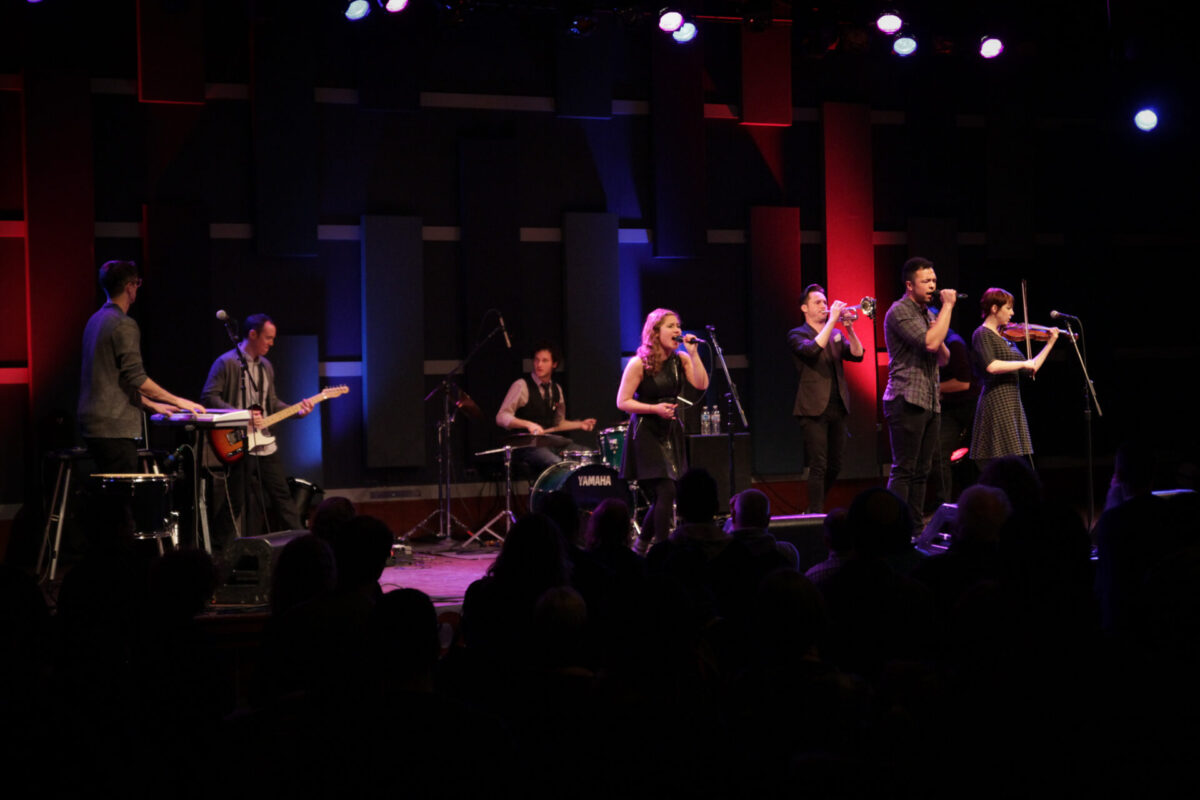
December 13. San Fermin is playing and the chamber-pop from their self-titled record is bright with brass. After we met last Friday, Austin got in touch. We’ve made plans to get a beer tomorrow, and I am all trumpets.
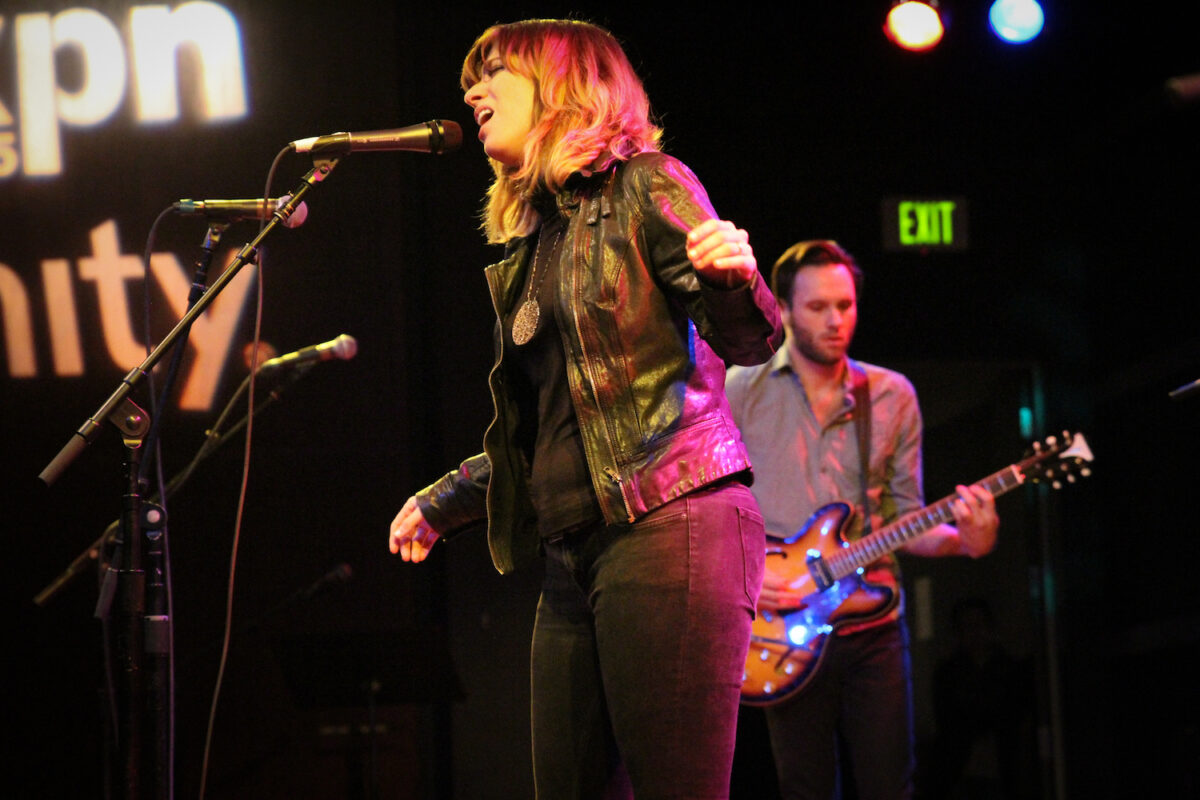
January 3. In a bluesy ramble, Nicole Atkins sings the songs she wrote after a hurricane tore through her house. Sometimes Dad’s cancer feels like a storm: the crises of diagnosis, surgery, the urgent work of recovery. Sometimes it feels like a steady drizzle. These past few months, he’s been at home a few blocks west of here, resting on the couch, rising shakily when the physical therapist comes, or when it’s time to leave for chemo. We’re always waiting for another MRI, wondering whether these interventions are keeping the tumor small. He’s managing. Our time together is slow and meaningful. But always there’s the gray, the soft wash of rain. And we brace ourselves. We know that eventually, it’ll tear the whole house down.

February 28. Annie Clark starts her set by inviting us to be present. Pocket your phones, she says. Be here. In all her work under the art-rock persona St. Vincent, Clark creates worlds and invites us inside them. These days, I don’t need the invitation. Music, on Friday afternoons, has become a portal for me to crawl through, a gift of time and privacy to explore the varied emotions of this winter. Clark, with her mad-science hair and spacey dance tunes, tugs me through the tesseract.
St. Vincent has just released a self-titled album, what Clark calls “a party record you could play at a funeral,” which feels apt. For nearly three months I’ve been seeing Austin. We talk for hours in dim bars; I cook him dinner; he gives me books. I write him songs; he writes me poems. He meets my family and I meet his. Our love grows fast, happily, easy. Earlier this month, I told him I’d like to marry him, and he agreed.
Meanwhile, Dad’s health is declining. The walks up and down 46th Street that kept him strong in warmer weather are impossible on winter’s slick sidewalks. This month, rib pain sent him to the ER, where doctors found a blood clot in his lung. Last summer, it seemed like he might have years left. But his increasing weakness makes me wonder if I’ll lose him in a matter of months.
On “Rattlesnake,” Clark’s guitar shivers with static and devolves into chaos. On “I Prefer Your Love,” she sings about her mother’s illness. Here, the music slows down and opens into languorous organ chords. She’s talking me through all of it: the chaos, the stillness. Wonder what will become of your little one, she sings.
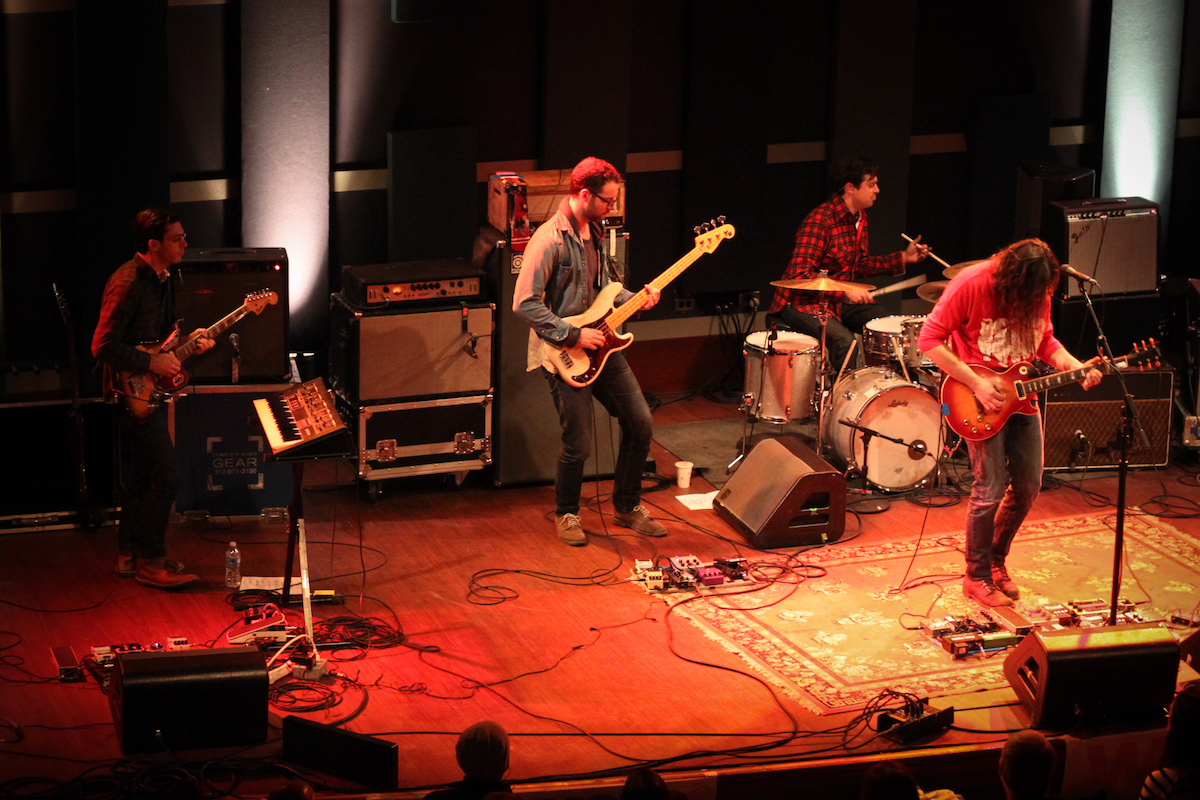
March 14. The War on Drugs will release Lost in the Dream in four days and they’re playing the opening track “Under the Pressure.” As with so many of their tunes, there’s at once breezy momentum and melancholy on this new track. Steady percussion, bright guitar, and ambient keys feel like a windows-down summer drive, but Adam Granduciel’s voice, which so many have called Dylanesque, keeps tipping, the melody of every phrase sloping downward. It’s a gloomy pattern.
What really gets me, though, is that baritone sax. It comes as a surprise about halfway in and its low, reedy tone stirs the latent mourning that lives quietly beside my joy. Rather than dance, I sit on the staircase that climbs up to the mezzanine. There, in the utter dark, I find myself crying.
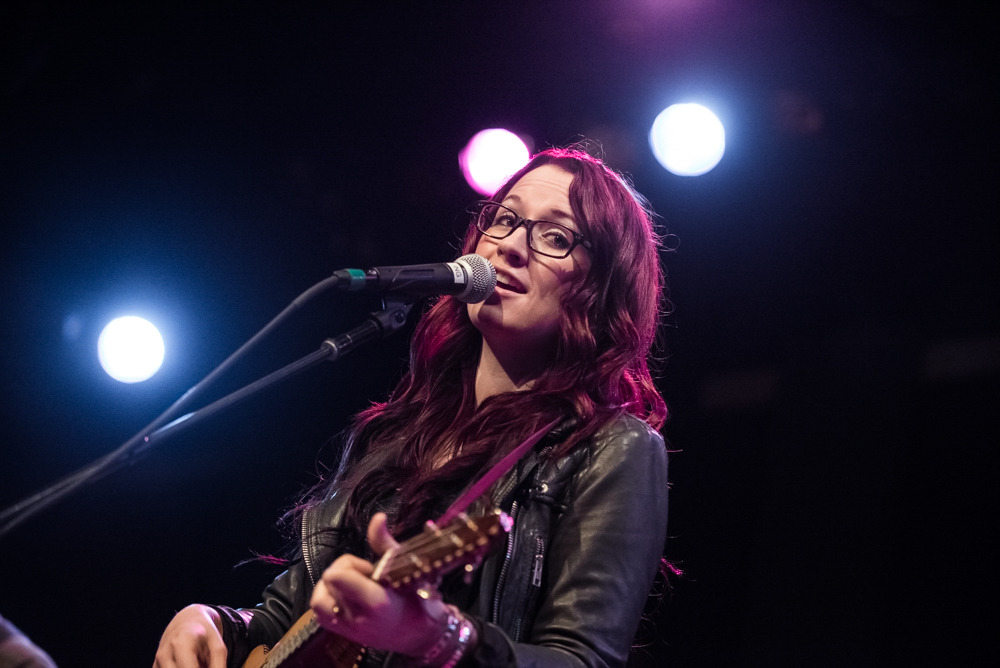
May 30. Dad’s been in the hospital, then in rehab, three weeks. He was admitted for a series of small seizures that made him drag his feet and speech. Seizure meds disturbed his circulation, and now doctors are trying to manage his blood, which clots or pools but does not course as it should. Austin and I have begun to wonder how to plan a wedding. We’ve looked at rings. We’ve scouted spaces in the neighborhood: the Rotunda, the mansion at the Woodlands, the vacant Gothic Revival cathedral at 42nd & Spruce. Austin spent an afternoon with my father, and told him he’d like to marry me.
Today Ingrid Michaelson is on stage, promoting Lights Out. Since its release, I can’t stop listening to “Wonderful Unknown,” not the hit single but the understated third track. I listen at my desk and cry. I listen on the train and cry. I cry because I’m sad, but also because I’m hopeful, and because I’m overwhelmed to be holding lament and hope in the same hand. This song helps me carry it all. Its lyrics are about beginnings and ends, and the simple middle: baking bread, raising toddlers. Its tone is timid and courageous, lonely and intimate, hopeful and fearful. I am in love and in mourning, and I don’t want to let one eclipse the other — to miss the last moments of my father’s life because I’m falling in love, or to miss the bliss of new love because my father is dying. Music uniquely welcomes this simultaneity. Whereas in visual art, two colors layered become another color, in music, two notes sound at the same time and each maintains its distinctive pitch.
Here we go / going in alone / into the dark and wonderful unknown, Michaelson sings. Soon I’ll commit to a lifetime with Austin. What mysteries will that lifetime unveil? Soon my father will slip into death, that mysterious twilight, that terrible, wonderful unknown.
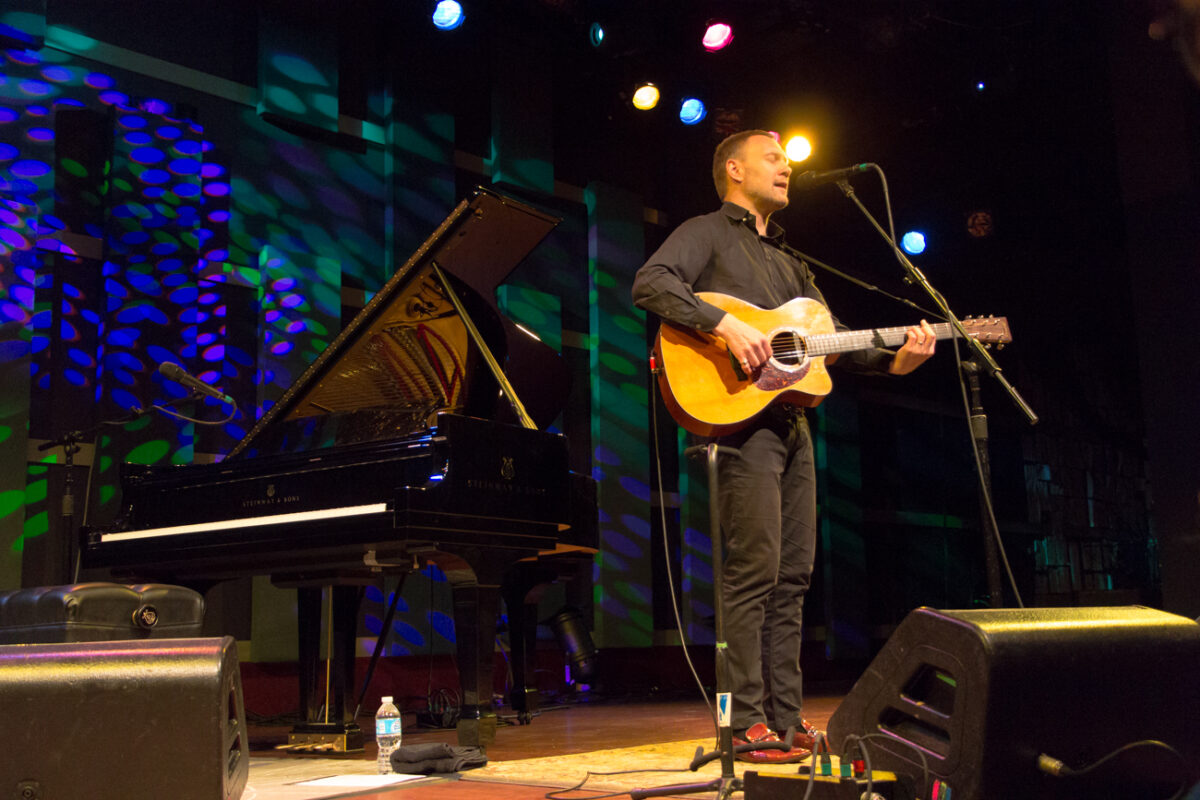
June 13. David Gray is up there playing “This Year’s Love” and I’m on the steps to the mezz, my elbows resting on my knees. This tune reminds me of late nineties rom-coms and I wish I could dismiss it except I’m undone by its pathos. Gray’s heathered voice is singing that familiar refrain — this year’s love had better last. I have an appointment this afternoon to try on wedding dresses. I’m thinking about the solidity of the marriage vow, grateful to have found a love that will last, but Gray is reminding me of love’s inevitable fragility. I think of my parents, who face the tearing of love at life’s end, and I’m struck that people choose, every day, to take this risk.
I’ll leave work early to go to the dress shop. On my way, I’ll pick up my mother, and she’ll tell me the doctors don’t expect Dad to live through the weekend. I’ll almost abandon the dress errand but Mom will say, “You’re going to need something to wear.” The next day, Austin and I will get married at my parents’ house at nightfall. Satie’s first Gymnopédie will play, soberly, gracefully, as I descend the staircase. I’ll hold peonies and stand with Austin beneath an arch of backyard greens and baby’s breath, dozens of friends and family members as witnesses, and Dad there in a bed in the living room.
A month will pass, through which Dad will mostly sleep, and he’ll die in mid-July, in the dusky light just before sunrise.